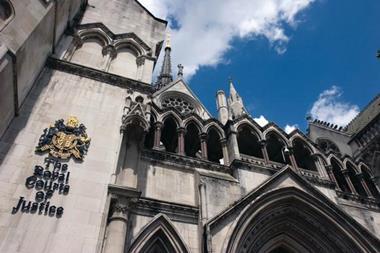A Court of Appeal ruling boosts the requirement on employers to provide a safe workplace
A recent Court of Appeal decision on industrial deafness has big implications for Employers Liability, according to a lawyer close to the case.
The case refers to a February 2007 decision by the Nottingham High Court to dismiss claims by seven former textile workers that they had suffered noise induced hearing loss after working in factories.
One of the claimants decided to appeal that decision. She claimed that her employer was in breach of its duty to provide a safe workplace. On May 22, the Court of Appeal delivered its judgement on this high profile case, Baker v Quantum Clothing.
The case hinged on the legal definition of safe under Section 29 of the Factories Act 1961. Put simply the Court of Appeal decided that noise levels in the textile factory represented a risk to workers, which meant the employer should have taken action to remove the noise.
“The case is expected to be appealed in the House of Lords in mid 2010.
In the lower court the employer relied on the defence of reasonably foreseeability, i.e. they could not reasonably be expected to know that the noise levels represented a health risk.
But Lady Justice Smith decided that safety was a purely objective matter to which foresight of risk was irrelevant. She said that from the introduction of a safety code of practice in the 1970s employers should have understood what represented unsafe noise levels and it was up to the employer to show that it had done all that was reasonably practicable to keep the workplace safe.
Cameron Clark, a partner at Halliwells, who has been closely involved in the case, said this judgment has considerable consequences to employers facing industrial deafness claims as well as all future employers’ liability claims.
He commented: ‘Although this decision involved an industrial deafness claim, it has wider policy implications spanning across all employers’ liability claims. It imposes a strict duty under statute upon employers even though Health and Safety Executive guidance and the general appreciation within the industry at the time as to what was considered safe was then different.’
“Every person with an Employers Liability claim will be able to rely upon this decision.
Clark continued: ‘The judge applied the advantage of hindsight to employers’ duties- making it much more difficult to defend these types of claims.’
‘This decision now extends beyond the issue of noise induced hearing loss,’ he added. ‘Every person with an Employers Liability claim will be able to rely upon this decision until, and unless, it is overturned.’
‘Claimants will look to take advantage of this pro-claimant interpretation of employers’ duties. They will be able to use the new definition of what ‘safe’ means as a weapon in their armoury against employers and their insurers,’ said Clark.
The case is expected to be appealed in the House of Lords in mid 2010. ‘We will be seeking to restate what was originally held in the Nottingham High Court,’ explained Clark, who has been asked to take the matter to the House of Lords.


















No comments yet